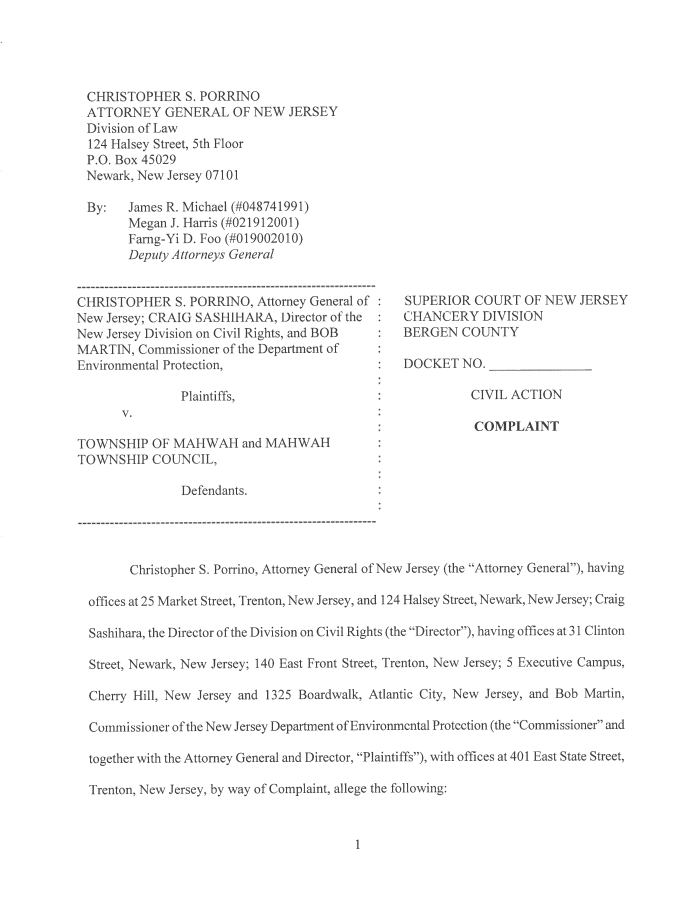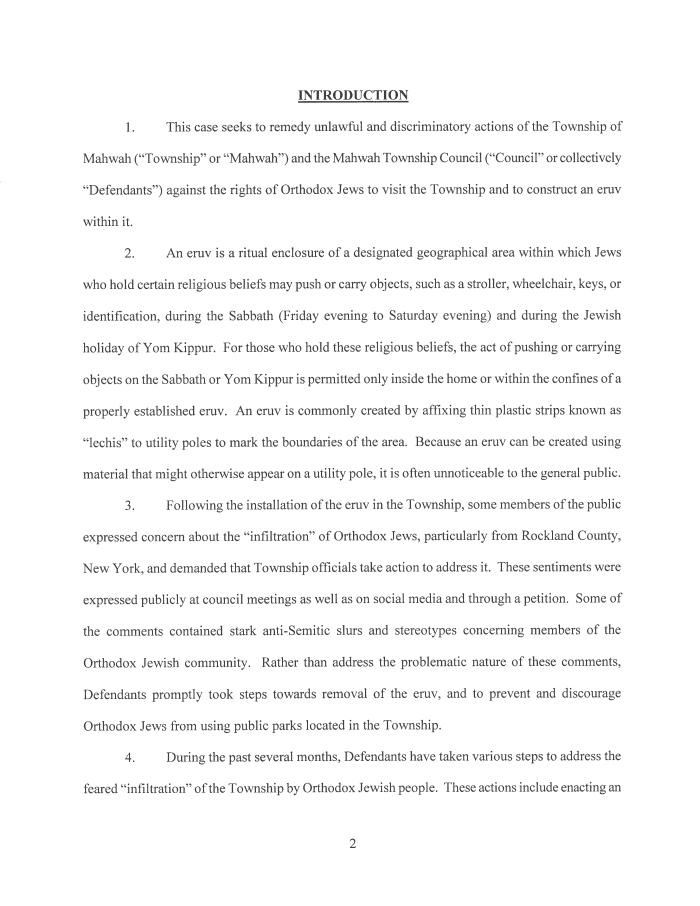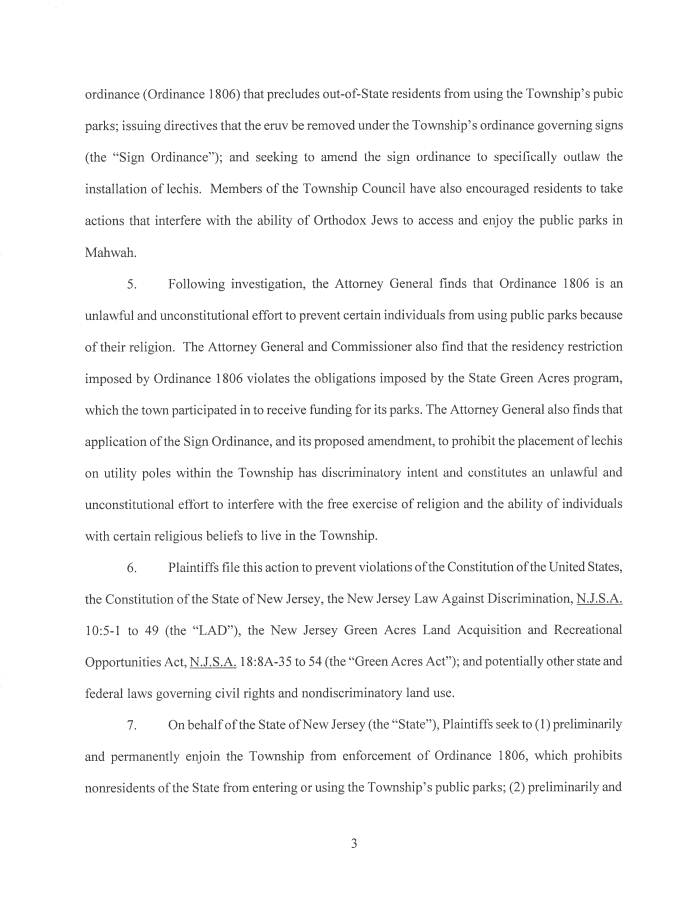Fearing an influx of Orthodox Jews from New York State, the Township of Mahwah introduced two hateful and discriminatory ordinances that illegally targeted that community, the state Attorney General's office alleged in a stunning complaint filed against the town on Tuesday.
The harsh public rebuke of both the actions of Mahwah's elected officials and the anti-Semitic sentiment of some residents likened the conduct of the town to the actions of "1950s-era white flight suburbanites who sought to keep African-Americans from moving into their neighborhoods."
The nine-count complaint, filed in Bergen County Superior Court, seeks a return of more than $3.4 million in state Green Acres grants received by Mahwah and an injunction blocking the two ordinances.
"This is an extensive complaint ... but the bottom line is very simple -- the township council in Mahwah heard the angry, fear-driven voices of bigotry and acted to appease those voices," Attorney General Christopher S. Porrino said in a statement.
The first ordinance, which went into effect at the end of July, limited the use of Mahwah's recreational facilities to New Jersey residents.
The second, which was introduced but not passed, was the expansion of an existing ordinance that banned signs on utility poles, amended to include any "device or other matter." It effectively would have banned the formation of an Orthodox Jewish religious boundary known as an eruv, which is designated by white piping called "lechis" on utility poles, the state alleged.
"I repeatedly warned the council of these consequences for months," Mahwah Mayor Bill Laforet said Tuesday.
The religious boundary, which in this case extended from Rockland County, allows Orthodox Jews to do everyday things such as carry house keys or push baby strollers outside of the home on the Jewish Sabbath.
Despite approval from the utility company, the township ordered that the lechis be removed. A group called the South Monsey Eruv Fund and residents from Rockland County filed a federal lawsuit in August to allow the lechis to stay.
A ban on an eruv, or threats to have it removed, is "tantamount" to housing discrimination because it could prevent Orthodox Jewish families from living in Mahwah, according to the complaint (which can be read at the end of this story).
Many residents have come out in support of the township's decision, creating Facebook groups and online petitions.
A town's order to remove a religious boundary has led to a federal lawsuit. Here's what you need to know.
But the complaint takes Mahwah's residents to task for their alleged behavior.
The council, the state says, was "influenced largely" by the "vocal anti-Orthodox Jewish sentiment" from some residents on social media and in public meetings.
"I was wondering if there are any thoughts and procedures in place to keep the Hasidic Jewish people from moving into Mahwah?" one resident asked at a June 29 council meeting. "They have chased us out of two towns we lived in and now they are buying up houses in Suffern."
"I don't know if you noticed, but the Hasidics have been making themselves very comfortable in our town parks," said another.
A third suggested people bring their dogs to town parks in an effort to "scare them away."
Residents also called Mahwah police to report that people who appeared to be Orthodox Jews were using parks, though the callers did not allege that the people were doing anything wrong, the complaint says.
The state attorney general dropped a bombshell complaint against Mahwah, ripping into the township for an alleged pattern of discrimination against an Orthodox Jewish community.
The state also alleges that Council President Robert Hermansen received an email from a Mahwah resident not of Orthodox Jewish faith who was concerned that her mother, a New York resident, wouldn't be able to take her grandchildren to the park in Mahwah.
Hermansen allegedly responded that the resident's mother shouldn't worry and that the park ordinance was not intended to "address her situation," according to the attorney general's news release. Hermansen went as far as to suggest a neighborhood watch, writing in a social media post that "the goal is to have everybody working together to make sure that our poles stay clean in Mahwah," according to the complaint.
Laforet, lashed out a Hermansen in a statement on Tuesday.
"It has been a lonely and painful struggle for me and my family these past several months, having to deal with a reckless and oblivious council president, Rob Hermansen," Laforet said. "He personally led his council mates to this action by the state's highest law enforcement official, and is most accountable. ... His race-baiting bantering has now bitten him back. His disgraceful behavior is now worsened by the severe potential financial penalties facing the township's taxpayer.
"But, I am sorrowed by the loss of reputation for Mahwah which is as diverse, tolerant and welcoming a community that you can find in NJ."
Hermansen could not be immediately reached for a response.
"Our public officials are sworn to respect and uphold the rule of law, to set an example and represent all citizens -- not just those with the loudest voices," said Porrino. "No person should need to hide his or her religious faith to live, work, or enjoy a local park."
The complaint alleges that the parks ordinance and the amended sign ordinance are "abuses of municipal power" and violate the First, Fourth and 14th Amendments of the Constitution.
"To think that there are local governments here in New Jersey, in 2017, making laws on the basis of some archaic, fear-driven and discriminatory mindset, is deeply disappointing and shocking to many, but it is exactly what we are alleging in this case," Porrino said. "Of course, in this case we allege the target of the small-minded bias is not African-Americans, but Orthodox Jews. Nonetheless, the hateful message is the same."
The state seeks more than $3.4 million it claims Mahwah received and used in state Department of Environmental Protection Green Acres grants to purchase and maintain its parks.
The land acquired in the state program cannot be restricted based on religion or residency, the attorney general's office said.
"What's been happening in Mahwah with respect to the township's parks ordinance is not in accordance with the original intent of the Green Acres Program," DEP Commissioner Bob Martin said. "As such, it is unacceptable, and it cannot be allowed to stand."
Lechis exist in more than 20 towns in New Jersey, including East Brunswick, Englewood and Fair Lawn. But other towns, such as Upper Saddle River, are also fighting the issue.
"Our message to those public officials in Mahwah who are leading or following this misguided charge is meant to be loud and clear: We intend to hold you accountable," Porrino said in the statement. "Our message to local officials in other towns who may be plotting to engage in similar attempts to illegally exclude, is the same: We will hold you accountable as well."
Mahwah has introduced other rules or laws to protect against the Orthodox Jewish "invasion," including a "no knock" ordinance proposed on Sept. 14, 2017 that was created in response to rumors of door-to-door home purchase solicitations by "members of the Jewish faith," the complaint alleges.
The park ordinance was roundly criticized by local law enforcement, including by Mahwah Police Chief James Batelli, who publicly questioned how he and his force would be able to enforce the rule without violating constitutional rights.
Bergen County Prosecutor Gurbir Grewal backed Batelli and responded in a letter to the chief that he thought the park rule "raises numerous constitutional concerns" and told him to not enforce the ordinance.
The lawsuit maintains that enforcing the ordinance would "subject affected persons to an unreasonable search."
Batelli went as far as to email council members over the summer to let them know that regardless of what some others might have thought about his decision, he determined that damage to the eruv would be investigated as a bias crime.
The correspondence was revealed in a response to an NJ Advance Media records request that included hundreds of pages of emails, many of them redacted due to "attorney-client privilege."
"I fully understand that there are differing opinions on this issue and I have received comments from people both agreeing and disagreeing with me, but as a law enforcement official this is not a decision I make based upon public opinion or sentiment," Batelli wrote in an email in August to council members, the town lawyer and Mayor William Laforet.
Hermansen, the council president, also objected to the eruv vandalism being treated as a hate crime, the complaint alleges.
Vandalism to the lechis occurred three times over the summer. In September, Batelli released a photograph of two people police had identified as suspects in the hopes that someone would come forward with more information.
In an interview on Monday, before before the attorney general's complaint was made public, Batelli said his department was "very close" to identifying both parties believed to be involved in the vandalism.
But Batelli declined to say whether he received direct criticism from Council members about how he was investigating the incident.
Most of the information in the collection of emails released has been redacted.
"I am sadly disappointed that some residents of Rockland County have decided to invade my state, county and town," one resident wrote. "They have crossed state, county and township boundaries for their own benefit - with no benefit to my fellow Mahwah residents."




I understand these neighbors. If I lived in a community for some time, I would not appreciate any group coming and overrunning my town, if they don't assimilate into the fabric of the community. I would feel this way about Muslims, Hispanics, Chinese, and yes US Jews...
ReplyDeleteNothing against any of these races, only an appreciation for cohesion.
The fact that the courts ruled against them, will not change the minds of the neighbors...that are probably feeling terribly wronged. We should all be concerned of starting up, but especially those that are always screeching התגרות באומות when it comes to our land!!
What about if New Yorkers decided new jersyians can't use new york tax paid parks and roads etc.. a slippery slope!
DeleteBaruch Hashem about this story!
ReplyDeleteWhat's the weather like there?
ReplyDeleteMaybe the township should institute a monthly "bikini day" instead.
...
And haredim who can handle it should be welcomed.
A message to my chasidish brethren:
ReplyDeleteIf you want to use these parks, please behave like humans. Don't leave garbage all around, as in candy wrappers, tissues, etc. I say this because many of you have no consideration of others when it comes to these things. If you behave and respect the neighbors, they will respect you.
white pipik called lechis, what's that?
ReplyDeleteMove to Bnei Brak where my parents live and you don't need pipiks and lechisses. On the other hand wait for Moshiach and install lechiss in golus.
Why Chafraud?!
ReplyDeleteAish,
ReplyDeleteAssuming you're really asking why...
Because it's a fun and acceptable way to repel religious fundamentalists and extremists.
chafraud, youre not looking too good, you're bringing in ridiculous stuff which has nothing to do with this issue, you won't convince anybody by just poking fun at random.
ReplyDelete7:21 PM,
ReplyDeleteConvince anybody? We're not likely going to solve this township's problem in the comment section of DIN. Don't deny me a bit of fun.
Mawah's approach to dealing with it was just stupid. But their fear is justifiable. And I hope they can save and preserve the township they love and prevent it from becoming an ultra-Orthodox shtetl of welfare supported Chasidim.
Just enforce zoning laws, building codes, welfare rules and prosecute with zero tolerance. They'll all move back to Ramapo where rules don't apply.
ReplyDeleteChafraud, even in Goyishe societies that should not be made acceptable... And it should not be considered fun...
ReplyDeleteAish,
ReplyDeleteIn warm climates such attire and similar is acceptable. Though haredim (who fear places like beaches) prefer their body stench and heat strokes.
Also, ultra-Orthodoxy has zero value for fun. And I would never take seriously the haredi opinion of what should be considered fun.
Haredistan is a no-fun zone.
I recall Chabad considered women in bikinis very offensive. Raping little boys in Ohelei Torah... not so offensive. Voodoo chicken slaughter rituals to remove sin... now that's fun! There's nothing like a dying chicken with it's throat slit, writhing in pain, drenched in it's own blood to give a Lubavitcher a good time. Don't forget... three chickens for preggers (and they often are)!
You're still being very cynical... Not that that's always bad, but it often can be.
ReplyDeleteI appreciate if people want to have fun. I understand if Goyim want to walk around in a bathing suit. It's truly unacceptable -- even in the heat, at least wear some kind of clothing -- but I "accept" it. Just don't look.
P.S. The whole chicken paragraph, etc. is very offensive actually and I really don't agree...
It may be very offensive. But that doesn't mean it's not accurate.
ReplyDeleteIt was all taken from the words of Chabad Lubavitchers themselves, or my experience with them.